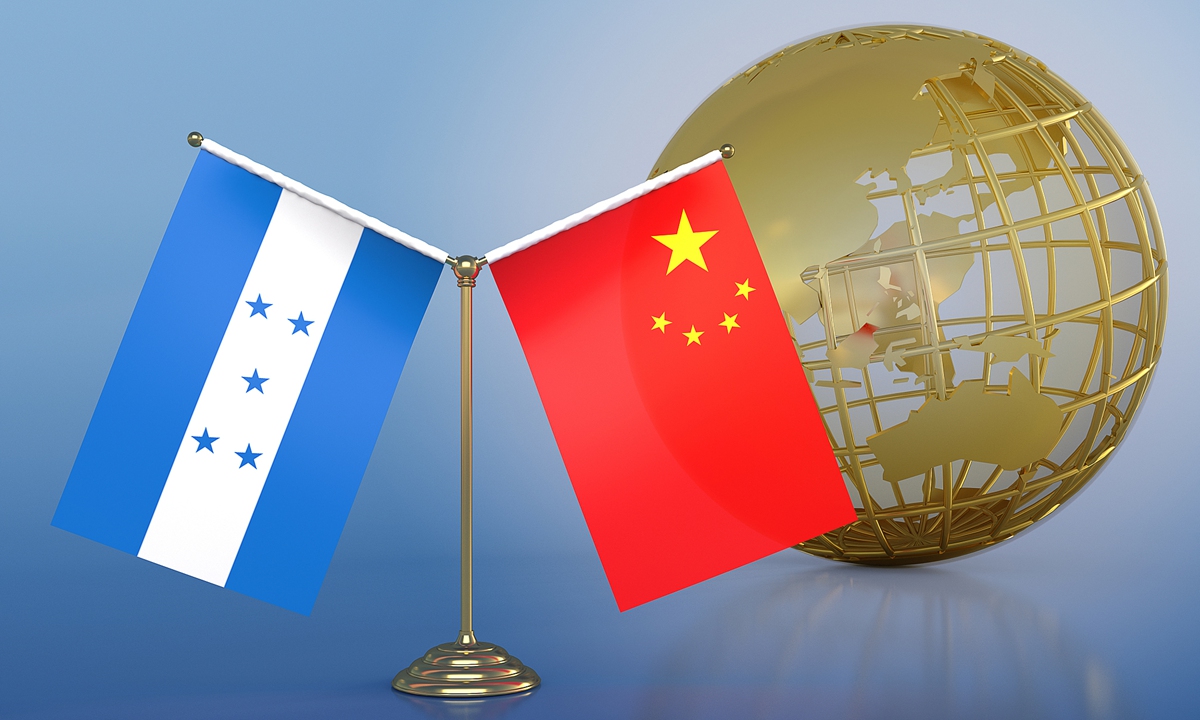
National flags of China, Honduras Photo: CFP
China welcomed on Wednesday the latest remarks by Honduran President Xiomara Castro, who said her country is seeking to establish diplomatic relations with China. Some experts believe that with Central American countries enjoying increasing dividends due to their cooperation with China, it is just a matter of time before the remaining countries sever "diplomatic ties" with the Taiwan island.
In response to this, Wang Wenbin, spokesperson of the Chinese Foreign Ministry, said at a press conference on Wednesday that 181 countries around the world have established diplomatic relations with China on the basis of the one-China principle, which fully proved that establishing diplomatic relations with China is a correct general historical and political trend.
"On the basis of the one-China principle, China is willing to develop amicable and cooperative relationships with all countries around the world, including Honduras," Wang said.
Castro said in her Twitter account that she instructed Honduran Foreign Affairs Minister Eduardo Reina to undertake the opening of official relations with China, as a sign of her determination to expand frontiers freely in concert with the nations of the world.
It was not the first time that the Honduras leader has expressed such intention, as Castro said during her presidential campaign in 2021 that she would seek diplomatic relations with China if she was elected, but her government backtracked on those comments after she took the office, according to media reports.
If the Central American country establishes diplomatic ties with China, it would also serve as a heavy blow to the island of Taiwan, some experts said, especially after Nicaragua and China resumed diplomatic relations in December 2021. Nicaragua was the eighth country that the island of Taiwan has lost relations with after the DPP's Tsai Ing-wen became the Taiwan regional leader in 2016.
"Castro made the commitment during her presidential campaign, but then the US exerted much pressure on the Honduran government, which might have made her government backtrack on those words," Jiang Shixue, a professor with the Center for Latin American Studies at Shanghai University, told the Global Times on Wednesday. "But now it seems that the Honduras government has withstood the pressure."
Some Chinese diplomats also welcomed Honduras' remark. Chinese Ambassador to Mexico Zhang Run tweeted that "the one-China principle is the consensus of the international community and one of the basic rules of international relations. Congratulations Honduras for this correct decision to embrace that principle!"
"China's growing economic presence and political influence in Central America and the Caribbean has changed the views of regional countries on China," Cui Shoujun, professor and director of Latin American studies at the Renmin University of China in Beijing, told the Global Times on Wednesday.
Since 2016, three regional countries - Panama, El Salvador and Nicaragua - that have established or resumed diplomatic relations with China have been receiving tangible development dividends, which is a factor that is encouraging Honduras, Cui said.
Honduras' exports are mainly agricultural and aquatic products. As the Chinese market is huge, the economic structures of the two countries are highly complementary and play a driving role, Cui noted.
In 2021, trade between China and Honduras grew 67.1 percent year-on-year to $1.62 billion, according to statistics from Chinese customs. By the end of 2021, Chinese enterprises had signed contracts worth $640 million in Honduras and completed a turnover of $700 million, according to the Chinese Ministry of Commerce.
"Central America is important for Taiwan to maintain its 'diplomatic relations,' and if Honduras severs ties with the island, it would deal a very heavy blow to the island," Jiang said.
Newspapers in Honduras reported in January that Chinese Vice Foreign Minister Xie Feng met Honduran Minister of Foreign Affairs Enrique Reina in Brazil in January at the inauguration of Brazilian President Lula, and their talks reportedly focused on China's construction of a hydroelectric dam in Honduras.




